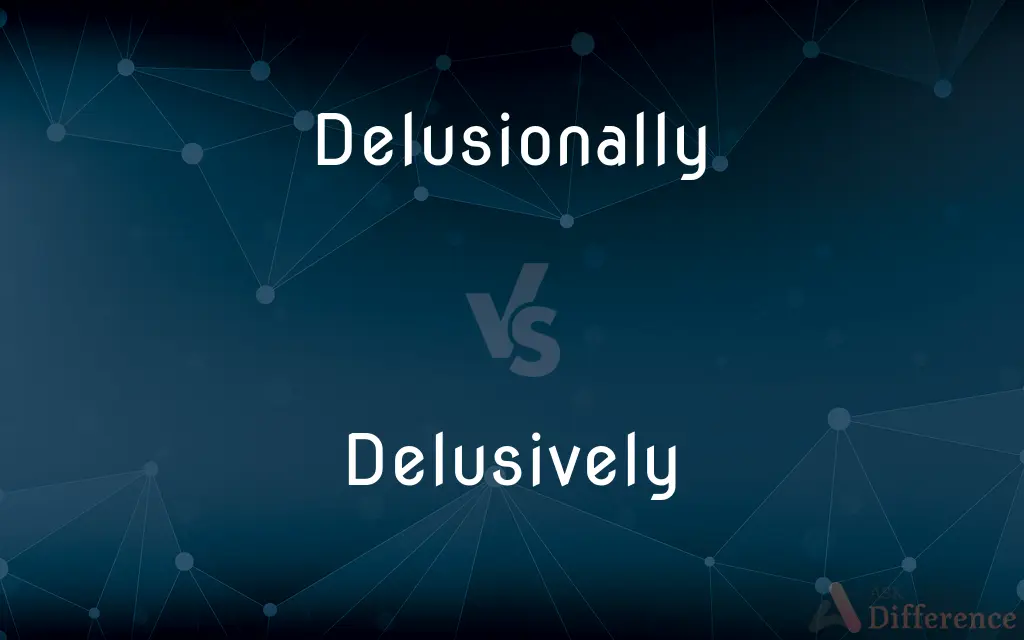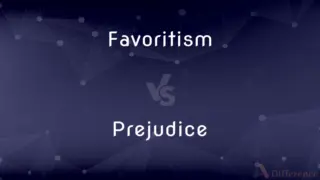Delusionally vs. Delusively — What's the Difference?
By Fiza Rafique & Urooj Arif — Updated on April 22, 2024
Delusionally refers to actions or thoughts stemming from delusions, often with a lack of reality, while delusively pertains to being misled or deceptive in a misleading way.

Difference Between Delusionally and Delusively
Table of Contents
ADVERTISEMENT
Key Differences
Delusionally is used to describe behavior or thoughts influenced by delusions, which are strong beliefs held despite contradictory evidence, often related to mental health contexts. On the other hand, delusively refers to actions, thoughts, or states that are deceptive or give a false impression, typically involving intentional deceit or unintentional misunderstanding.
When discussing perception of reality, delusionally implies a significant detachment from reality, driven by psychological factors internal to the individual. Delusively, however, suggests a distortion of reality influenced by external deceptions or self-misleading thoughts that do not necessarily rise to the level of clinical delusions.
In terms of usage, delusionally is often associated with psychiatric evaluations and discussions about mental health, highlighting a pathological state. Whereas delusively can be used in broader contexts, including literature and everyday speech, to describe situations or behaviors where deception plays a role.
Delusionally often carries a more serious and clinical connotation, indicating a deeper and more persistent disruption in thought processes. Delusively, by contrast, might describe more transient or situational instances of being misled or misleading.
The implication of intent is also different: delusionally does not imply intent—it describes a state beyond the person's control. Delusively, however, can imply a range of intent, from self-deception to the intention to deceive others, making it versatile in describing various kinds of misleading actions or beliefs.
ADVERTISEMENT
Comparison Chart
Definition
Influenced by delusions
Involving deception or misleading
Context of Use
Psychiatric, mental health
General, including literature and speech
Relation to Reality
Significant detachment from reality
Distorted perception, not deeply detached
Connotation
Clinical, serious
Often involves intent, less severe
Implication of Intent
No intent, beyond control
Can imply both self-deception and deceit
Compare with Definitions
Delusionally
Influenced by false beliefs firmly held.
He was delusionally convinced of the conspiracy.
Delusively
Relating to self-deception.
She was delusively optimistic about the project's success.
Delusionally
Characterized by a break from reality.
The patient was delusionally disconnected from the actual events.
Delusively
Characterized by causing or being an illusion.
He spoke delusively of success despite failures.
Delusionally
Exhibiting behavior typical of delusions.
She reacted delusionally to normal events.
Delusively
In a misleading or deceptive way.
The magician's act was delusively convincing.
Delusionally
In a manner indicative of delusions.
He spoke delusionally about his power and influence.
Delusively
Giving a false impression.
The shadows played delusively on the wall, resembling figures.
Delusionally
Suggesting profound irrationality.
Her accusations were delusionally baseless.
Delusively
Tending to deceive.
The brochure described the resort delusively.
Delusionally
In a delusional way.
Delusively
Tending to delude.
Delusively
Having the nature of a delusion; false
A delusive faith in a wonder drug.
Delusively
In a delusive or deluded manner.
Delusively
In a deceptive and unrealistic manner;
The village looked delusively near
Common Curiosities
What is the primary implication of someone acting delusionally?
Acting delusionally implies behavior based on firm yet false beliefs, detached from reality.
What distinguishes delusively from delusionally in terms of reality?
Delusively involves distortions of reality often influenced by external factors, while delusionally involves a more profound and often pathological detachment from reality.
How does delusively relate to deception?
Delusively relates to actions or thoughts that deceive, either as self-deception or misleading others.
Can delusionally be used outside of mental health discussions?
While primarily used in mental health contexts, delusionally can sometimes be used metaphorically in other discussions to emphasize extreme irrationality.
Is delusionally associated with a specific mental condition?
Yes, delusionally is often associated with conditions like schizophrenia or severe bipolar disorder.
Does delusively always imply negative intent?
Not always; delusively can describe situations where someone is innocently misled or misleads themselves without harmful intent.
How common is the use of delusively in everyday language?
Delusively is less common than terms like 'deceptive' but can be found in discussions involving literature or detailed analyses of behavior.
What does "delusively" mean?
"Delusively" pertains to actions or statements that are misleading or give a false impression.
In what context might "delusively" be used?
"Delusively" might be used when describing someone's behavior that deceives others into believing something unreal, e.g., someone delusively portraying success.
What does "delusionally" mean?
"Delusionally" refers to something done in a manner influenced by delusions, which are strong beliefs held despite evidence to the contrary.
How can someone act "delusionally"?
A person acts delusionally when their actions are based on false beliefs or misconceptions about reality, e.g., insisting they have supernatural powers.
Can delusionally describe a temporary state?
Typically, delusionally describes a more persistent state, though it can be used temporarily in a metaphorical sense.
Is there a difference in the implication of "delusionally" vs. "delusively"?
Yes, "delusionally" implies actions based on internal misconceptions, whereas "delusively" suggests an intent to mislead others.
Can "delusionally" and "delusively" be used interchangeably?
While both can relate to deception, they are not typically interchangeable because "delusionally" refers to self-deception, and "delusively" to deceiving others.
Share Your Discovery

Previous Comparison
Cabling vs. Wiring
Next Comparison
Favoritism vs. PrejudiceAuthor Spotlight
Written by
Fiza RafiqueFiza Rafique is a skilled content writer at AskDifference.com, where she meticulously refines and enhances written pieces. Drawing from her vast editorial expertise, Fiza ensures clarity, accuracy, and precision in every article. Passionate about language, she continually seeks to elevate the quality of content for readers worldwide.
Co-written by
Urooj ArifUrooj is a skilled content writer at Ask Difference, known for her exceptional ability to simplify complex topics into engaging and informative content. With a passion for research and a flair for clear, concise writing, she consistently delivers articles that resonate with our diverse audience.














































